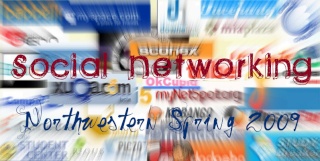Net Workings!
Page 1 of 1
 Net Workings!
Net Workings!
Article: http://www.smithsonianmag.com/specialsections/innovators/kleinberg.html
In this article "Net Worker", the author gives us an insight into where some of Jon Kleinberg's research stems from. This should be interesting, since he co-authored the textbook we're all reading!
"Some of Kleinberg's research builds on social psychologist Stanley Milgram's famous 1960s experiments into the 'small-world phenomenon.' Milgram enlisted a random group of people in Omaha and asked each to forward a letter to one close acquaintance, with the goal of reaching a certain stockbroker in Massachusetts. By tracking the letters, he came up with his 'six degrees of separation' theory: any two people on earth are connected by a string of five or fewer mutual acquaintances. Forty years later, Kleinberg runs his own tests on the small-world phenomenon sitting at his computer, poring over data…"
Kleinberg believes there are "heavy traces of geography" in interaction with friends via social networking sites. That is true, I suppose. How many of you have friends on Facebook from around here, and then all over the place... perhaps, friends from high school that are living in various locations these days. It is easy to assume and see that "even in cyberspace, friendships depend on proximity".
Kleinberg goes on to say that "he expects to see machines, applications and Web sites become better at responding to users' past behavior and prompting them. Your computer might insist you reply to an important e-mail that's been waiting too long, scold you for procrastinating or, sensing that you're about to leave the office, remind you what's left to do. In a statistical sense, he says, computers 'know much more about your behavior than you do.'"
Haha, this seems to be what Google's April Fools prank this year entailed. Here’s a link, for those of you you didn't catch it yet! Link: http://mail.google.com/mail/help/autopilot/index.html
Here's my favorite part:
What happens if a sender and recipient both have Autopilot on?
Two Gmail accounts can happily converse with each other for up to three messages each. Beyond that, our experiments have shown a significant decline in the quality ranking of Autopilot's responses and further messages may commit you to dinner parties or baby namings in which you have no interest.
HA HA!
In this article "Net Worker", the author gives us an insight into where some of Jon Kleinberg's research stems from. This should be interesting, since he co-authored the textbook we're all reading!
"Some of Kleinberg's research builds on social psychologist Stanley Milgram's famous 1960s experiments into the 'small-world phenomenon.' Milgram enlisted a random group of people in Omaha and asked each to forward a letter to one close acquaintance, with the goal of reaching a certain stockbroker in Massachusetts. By tracking the letters, he came up with his 'six degrees of separation' theory: any two people on earth are connected by a string of five or fewer mutual acquaintances. Forty years later, Kleinberg runs his own tests on the small-world phenomenon sitting at his computer, poring over data…"
Kleinberg believes there are "heavy traces of geography" in interaction with friends via social networking sites. That is true, I suppose. How many of you have friends on Facebook from around here, and then all over the place... perhaps, friends from high school that are living in various locations these days. It is easy to assume and see that "even in cyberspace, friendships depend on proximity".
Kleinberg goes on to say that "he expects to see machines, applications and Web sites become better at responding to users' past behavior and prompting them. Your computer might insist you reply to an important e-mail that's been waiting too long, scold you for procrastinating or, sensing that you're about to leave the office, remind you what's left to do. In a statistical sense, he says, computers 'know much more about your behavior than you do.'"
Haha, this seems to be what Google's April Fools prank this year entailed. Here’s a link, for those of you you didn't catch it yet! Link: http://mail.google.com/mail/help/autopilot/index.html
Here's my favorite part:
What happens if a sender and recipient both have Autopilot on?
Two Gmail accounts can happily converse with each other for up to three messages each. Beyond that, our experiments have shown a significant decline in the quality ranking of Autopilot's responses and further messages may commit you to dinner parties or baby namings in which you have no interest.
HA HA!
SBonthu- Posts : 38
Join date : 2009-04-06
Page 1 of 1
Permissions in this forum:
You cannot reply to topics in this forum|
|
|
